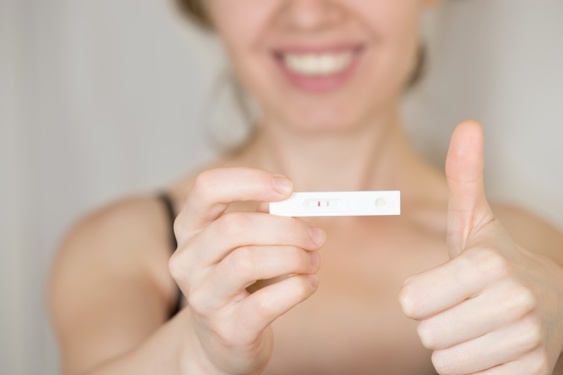Pregnancy after assisted reproduction: commons early symptoms

If you are undergoing fertility treatment, it’s completely normal to be on the lookout for any symptoms that might indicate a long-awaited pregnancy following an embryo transfer or a cycle of artificial insemination.
That’s why at URE Centro Gutenberg we want to talk to you today about the early symptoms that suggest that embryo implantation has taken place.
But there’s one very important thing to keep in mind: each patient is unique, meaning that the absence of these signs doesn’t mean that the result is going to be negative, just as their presence doesn’t mean there’s going to be a pregnancy 100% of the time.
Aversion to certain smells and/or foods
Don’t be alarmed if you start to have cravings for something you’ve never liked.
Or, just the opposite, if you suddenly stop liking your partner’s cologne.
This is normal! Hormonal changes during pregnancy can increase sensitivity to smells, and sometimes it’s extreme. Examples? One patient recently told us that she craved… spoonfuls of vinegar!
Increase in size and sensitivity of breasts
Another common symptom during pregnancy, due to changes in hormones, may be noticeable in your chest: your breasts become more sensitive and increase slightly in size.
Increased tiredness
This is also due to the hormonal changes taking place in your body following embryo implantation. You’ll feel more tired, more fatigued…
This means that if it’s 9 o’clock at night and you’re already falling asleep, don’t worry. It’s because of the hormones!
Vaginal bleeding
This is one of the symptoms that usually frightens our patients most, which makes sense as bleeding can be confused with menstruation.
This bleeding, however, has an explanation: in order for the embryo to attach to your body, certain blood vessels in the endometrium must break to form new ones, thus allowing the embryo to obtain everything it needs during development.
This vaginal bleeding does not always happen, nor is it the same for all women. In some cases it may hardly be noticeable, while in others it may seem like a menstrual cycle.
The important thing is to know how to tell the difference for your peace of mind, as this bleeding is light and generally pinkish or brown.
Abdominal pains
Just like in the previous example, this is a symptom that usually scares future mothers.
This is due to the fact that these pains are similar to those that appear during menstruation, so many patients then think that treatment has not been successful.
You should be aware, however, that these pains are normal and are generally caused by the uterus which is growing and changing position.
Frequent urge to urinate
This feeling of discomfort is caused by an increase in progesterone which leads to higher blood flow to the kidneys.
As a result your bladder fills more quickly, meaning you’ll need to pay more visits to the restroom…
Mood swings
This is one of the symptoms which most greatly varies from woman to woman: in some women mood swings are extremely intense, while others only notice mild changes.
Don’t be alarmed if you feel euphoric one moment and sad the next, or vice versa. This is part of the change that your body is going through!
Abdominal bloating and/or constipation
These are some of the unpleasant symptoms also caused by the increase in progesterone.
What happens here is that this hormone slows down movement in the intestines, thus resulting in constipation and, quite often, discomfort such as heartburn and the dreaded morning sickness.
As we mentioned at the beginning of this article, it is very important to remember that the absence of symptoms does not mean that you’re not pregnant. Some women experience much more intense symptoms, while others barely notice any special changes to their body.
In addition, also keep in mind that some symptoms such as abdominal bloating, constipation and tiredness could be the result of the hormone medication taken for fertility treatment, specifically the progesterone support that your fertility specialist has recommended to aid in embryo implantation.

